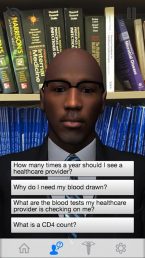Can an app boost medication adherence by young HIV-positive gay black men?
A five-year, $3.5 million grant from the National Institutes of Health will enable researchers at the University of Illinois at Chicago School of Public Health to refine and then further evaluate an avatar-based app that has shown promise in improving medication adherence among HIV-positive gay black men in a recently completed pilot study. The app, called My Personal Health Guide, allows users to obtain information about HIV and provides support for medication adherence from their cell phones in private.
“In our pilot trial of the app, users emphasized protecting their privacy regarding their HIV status and didn’t want features that were intrusive or that other people could see or hear,” said Dr. Mark Dworkin, professor of epidemiology in the UIC School of Public Health and principal investigator on the grant. “The app supports medication adherence by providing information spoken simply by a realistic avatar that explains why adherence is so important to their health. It also teaches about individual medications used to treat HIV, as well as their potential side effects. The app will be ‘gamified,’ as they say in the industry, meaning an educational game will be added so that the more you use it, the more features become unlocked, which may motivate sustained engagement with the app.”
HIV-positive gay black men have the lowest levels of retention in care and are less likely to achieve viral suppression, where levels of the HIV virus in the body reach undetectable levels. Having undetectable levels of the virus makes transmission to another person very unlikely and is a major principle of the concept that treatment really is part of prevention.
Dworkin and his colleagues developed the app to help improve adherence to antiretroviral medications, which need to be taken routinely and as prescribed in order to have the greatest effect on reducing viral load.
The app has two major functions: to answer questions about HIV and medication adherence and to support behaviors that contribute to regularly taking medication on time. The avatar empathetically acknowledges the difficulty of taking medication daily for a lifetime and addresses issues such as social support, privacy and mental health that are affected by the stigma of HIV. This stigma can be a major barrier to seeking testing and treatment, Dworkin said. Since the avatar speaks with simple, clear language, it can be especially useful to patients with low literacy, and it uses culturally appropriate language and phrases derived from focus group work with this population of young men, Dworkin explained. It also invites users to hear advice and motivational stories from other HIV-positive individuals, as well as their caregivers, from the app.
During the first year of the new grant funding, Dworkin and his colleagues will incorporate feedback from participants in the pilot study, which included 43 HIV-positive gay men, to refine the app before testing it in a larger group of participants. Men in the pilot study, which entailed using the app for three months, had improved adherence — by taking their medication an average of 80 percent of the time, up from 62 percent of the time before using the app. Participants also reported that the app and its functions were acceptable and useful.
“There was also specific feedback we received that we will incorporate into the app in the first year of the grant,” Dworkin said.
After refining the app and adding additional functionality based on user feedback, the 2.0 version of the app will be evaluated and compared with the use of a food safety app in a group of 295 HIV-positive gay black men in Chicago, Atlanta, and Jackson, Mississippi.
Participants will be randomized to use either the My Personal Health Guide app or a food safety avatar-based app for six months. Antiretroviral therapy adherence will be evaluated over the course of a month prior to the start of the study before participants start using the apps. Electronic medication containers that send an encrypted alert to the researchers each time the container is opened — and presumably a dose of medication is taken — will help the researchers track medication adherence as objectively as possible. The electronic containers will be used by all participants for the duration of the study.
Once the study starts, medication adherence and clinic appointment data will be collected over six months, and viral load will be collected at baseline and follow-up. Dworkin and his colleagues believe that men using the My Personal Health Guide app will show improvements in adherence, viral load and keeping up with medical appointments compared with men using the food safety app.
The researchers will also identify which parts of the My Personal Health Guide app users engage with most, and which may be most closely linked to improvements in outcomes to help them further tailor the app to be more effective.
“Reducing viral load, and even better, getting to undetectable levels, is not only good for the individual, but it significantly helps reduce the risk of spreading the virus to others,” Dworkin said. “And because strict medication adherence provides the best chance to reduce viral load, any tools we can give people to stick to their meds will ultimately prevent new infections and also keep people healthy.”

